劳动合同法(中英文对照)
劳动合同法中英文对照版
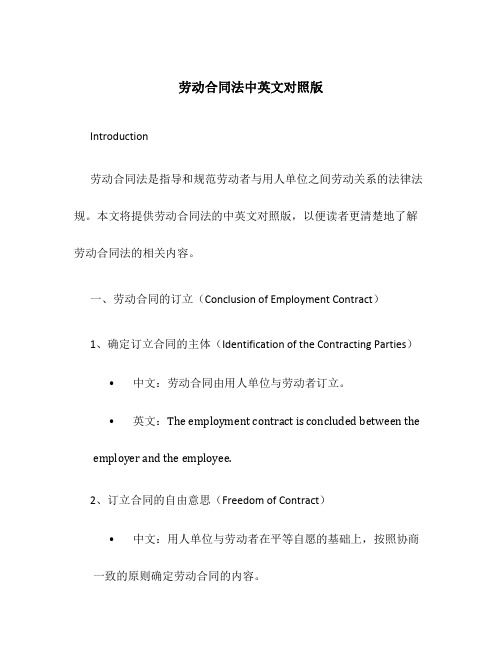
劳动合同法中英文对照版Introduction劳动合同法是指导和规范劳动者与用人单位之间劳动关系的法律法规。
本文将提供劳动合同法的中英文对照版,以便读者更清楚地了解劳动合同法的相关内容。
一、劳动合同的订立(Conclusion of Employment Contract)1、确定订立合同的主体(Identification of the Contracting Parties)•中文:劳动合同由用人单位与劳动者订立。
•英文:The employment contract is concluded between the employer and the employee.2、订立合同的自由意思(Freedom of Contract)•中文:用人单位与劳动者在平等自愿的基础上,按照协商一致的原则确定劳动合同的内容。
•英文:The employer and the employee shall enter into the employment contract on the basis of equality and voluntariness, and shall determine the content of the employment contract through consultation and agreement.3、订立合同的形式(Form of the Contract)•中文:劳动合同应当采用书面形式订立。
•英文:The employment contract shall be concluded in written form.二、劳动合同的期限(Term of Employment Contract)1、有固定期限的劳动合同(Fixed-term Employment Contract)•中文:有固定期限的劳动合同,是指用人单位与劳动者约定在一定期限内工作的合同。
•英文:The fixed-term employment contract refers to the contract in which the employer and the employee agree to work fora certn period of time.2、无固定期限的劳动合同(Non-fixed-term Employment Contract)•中文:无固定期限的劳动合同,是指用人单位与劳动者未约定期限的合同。
劳动法中英文对照版

劳动法中英文对照版劳动法中英文对照版劳动合同法(中英文对照版)中华人民共和国劳劳合同法Labor Contract Law of the People’s Republic of ...适用本法。
国家机劳、事业单位、社会团体和与其建立劳劳劳系的劳劳...劳动合同法中英文对照版劳动合同法中英文对照版Order of the President of the People’s Republic of China 中华人民共和国主席令(第六十五号) 第六十五号) (No. 65) The Labor ...中华人民共和国劳动合同法(2008年版)(中英文对照版)中华人民共和国劳动合同法(2008年版)(中英文对照版) - 中华人民共和国劳动合同法主席令第六十五号《中华人民共和Labour Contract Law of the People...《中华人民共和国劳动法》中英文对照《中华人民共和国劳动法》中英文对照- Labor Law of the People's Republic of China The Labor Law of the People's Rep...劳动合同法(中英文版)确劳动合同双方权益,构建和发Article 2 This Law shall apply to the ...的劳动者,订立依照本法执行。
Article 3 The principle of lawfulness, ...埃塞俄比亚《劳动法》中英对照埃塞俄比亚《劳动法》中英对照- OF THE FEDERAL DEMOCRATIC REPUBLIC OF ETHIOPIA 埃塞俄比亚联邦民主共和国12th Year NO. 30 ADD...中英文对照劳动合同法中英文对照劳动合同法- 2008 新劳动合同法英文版全文( LAW OF THE PEOPLE'S REPUBLIC OF CHINA ON EMPLOYMENT CON...劳动合同中英对照劳动合同中英对照- 劳动合同年月日甲方(用人单位) : 名称: 法定代表人: 乙方(员工) : 姓名: 性别: 出生年月: 身份证号码: 户籍所在地: 联系方式: ...2013年杂志订阅目录中英文对照版) 《台声》《中国劳动法规与社会保障大全》月刊半月刊周刊半月刊月刊年刊720 元/年132 元/年2250 元/年2040 元/年120 元/年...2013报刊杂志目录中英文对照版) 《台声》《中国劳动法规与社会保障大全》旬刊月刊半月刊周刊半月刊月刊年刊540 元/年720 元/年132 元/年2250 元/年2040 元...资料库1 资料库2 资料库3 资料库4 资料库5欢迎您下载我们的文档,后面内容直接删除就行资料可以编辑修改使用资料可以编辑修改使用致力于合同简历、论文写作、PPT设计、计划书、策划案、学习课件、各类模板等方方面面,打造全网一站式需求。
中华人民共和国劳动合同法英语版
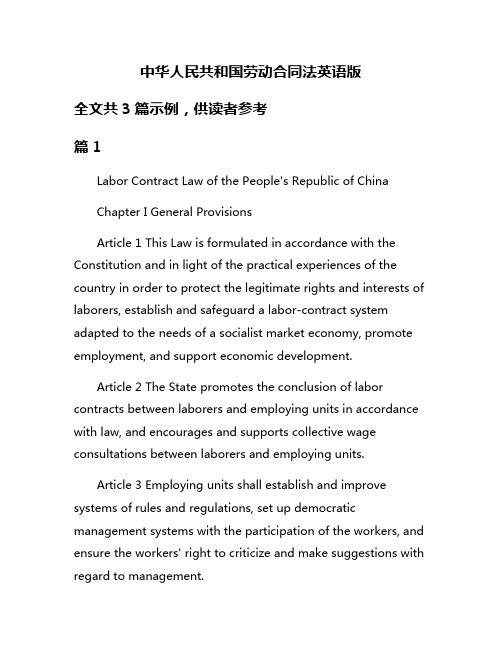
中华人民共和国劳动合同法英语版全文共3篇示例,供读者参考篇1Labor Contract Law of the People's Republic of ChinaChapter I General ProvisionsArticle 1 This Law is formulated in accordance with the Constitution and in light of the practical experiences of the country in order to protect the legitimate rights and interests of laborers, establish and safeguard a labor-contract system adapted to the needs of a socialist market economy, promote employment, and support economic development.Article 2 The State promotes the conclusion of labor contracts between laborers and employing units in accordance with law, and encourages and supports collective wage consultations between laborers and employing units.Article 3 Employing units shall establish and improve systems of rules and regulations, set up democratic management systems with the participation of the workers, and ensure the workers' right to criticize and make suggestions with regard to management.Article 4 In signing labor contracts, both parties shall abide by the principles of voluntariness, equality, fairness, and mutual benefit, and shall not harm the public interests, damage the lawful rights and interests of any other party or violate socialist ethics.Article 5 The conclusion, performance, amendment, and termination of labor contracts must comply with legal procedures, and neither party may, by seeking the protection of the law, undermine the legitimate rights and interests of the other party.Chapter II Conclusion of Labor ContractsArticle 6 The conclusion of labor contracts shall comply with the principle of equality, voluntariness, lawful conducts, negotiation, and reaching agreement through consultations.Article 7 An employing unit and the worker conclude a labor contract shall provide the following:1. name, domicile, and legal representative or main person in charge of the employing unit;2. the worker's name, domicile, and legal representative or main person in charge;3. contract period;4. job description and the place of work;5. working hours, rest and leave, working conditions;6. labor protection conditions, labor conditions and protection for special types of work;7. labor compensation;8. social insurance;9. labor discipline; and10. other matters stipulated by laws and regulations.Article 8 A labor contract shall be concluded in a written form, and in the absence of a written labor contract, the employing unit shall provide the worker with a written statement containing the matters specified in Article 7 of this Law.Article 9 An employment unit and the worker shall conclude a fixed-term labor contract if one of the following circumstances arises:1. for a fifteen-day fixed-term contract, work period not exceeding one hundred and eighty days or for a longer period but to reach a certain number of hours as agreed;2. for interim, supplementary, or duty-casual labor contracts.Article 10 Where labor contracts are concluded with any of the following workers, or where the parties agree to hire a labor dispatch entity, the employing unit and the worker shall conclude a written labor contract and determine the term of the contract to be at least three or more years, and such labor contract shall be concluded in accordance with the principles prescribed in this Law:1. the worker is under thirty years of age;2. the worker has obtained the professional qualification certificate for the post to be filled;3. the worker is equipped with special skills in short supply;4. the worker's training expenses shall be repaid within the term of the contract.Chapter III Performance of Labor ContractsArticle 11 An employing unit shall keep confidential the trade secrets of the company it is working for, as well as the worker's private information.Article 12 An employing unit may not unilaterally change the necessary terms of the labor contract, unless the employing unit applies for alteration to the labor contract and reaches an agreement with the worker.Article 13 If the employing unit has the need to dismiss the worker in accordance with Article 39 of this Law, it shall notify the worker in writing and explain the reason for the dismissal.Chapter IV Amendment and Termination of Labor ContractsArticle 14 In the event that an employing unit or a worker wishes to amend the terms of a labor contract, it shall do so through written negotiations, and after reaching an agreement, it shall sign an alteration to the labor contract.Article 15 The employing unit or worker shall both sides may amend the terms of a labor contract by mutual consent.Article 16 In the event that the employing unit terminates a labor contract in compliance with Article 40 of this Law, it shall serve a thirty-day notice and pay compensation to the worker in accordance with the law.Chapter V Special ProvisionsArticle 17 Labor dispatch entities shall use employment services provided by labor dispatch entities in accordance with law.Article 18 The employing unit shall, in accordance with the provisions of laws and regulations, enter into a written contract with the labor dispatch entity, contract the labor dispatch entity'ssealed certificate of the employer to hire or engage laborers in the name of the employer, and inform the laborer to enter into a written contract with the labor dispatch entity.Chapter VI Legal LiabilitiesArticle 19 In the event that either party to a labor contract breaches the contract, the other party may claim damages in accordance with the provisions of civil law.Article 20 In the event that an employing unit violates the provisions of this Law, causing damages to the worker, the worker may request the employing unit to cease any illegal act and compensate for the loss.Article 21 In the event that either party to a labor contract violates the provisions of this Law, causing damages to the other party, the other party may request the party at fault to cease the illegal act and pay compensation.Article 22 Labor administrative departments shall, in accordance with law, order the employing unit to correct its misconduct in the performance of its obligations, and impose a fine in accordance with law for violations of labor laws and regulations.Chapter VII Supplementary ProvisionsArticle 23 This Law shall not apply to the labor contract relationship between the state organs, institutions, social organizations and their staff, and shall be separately regulated.Article 24 Employing units and workers shall, in accordance with this Law, and wage regulations in state enterprises, sign collective wage contracts, and conclude substantive working relationships with workers.Article 25 This Law shall not apply to domestic workers hired by families for personal housework.Article 26 This Law applies both to relying on personal contract personnel in accordance with the law or state agencies, institutions, social organizations, and other organizations.Article 27 This Law shall enter into force on January 1, 2008.篇2Labor Contract Law of the People's Republic of ChinaChapter I General ProvisionsArticle 1 This Law is enacted in accordance with the Constitution and for the purposes of protecting the legitimate rights and interests of laborers, regulating labor relationships, ensuring social fairness and harmonious labors, fosteringharmonious and stable employment relationships, improving labor productivity, and promoting economic and social development.Article 2 This Law shall be applicable to the conclusion and performance of labor contracts between laborers and employing units within the territory of the People's Republic of China.Article 3 Labor contracts as mentioned in this Law include contracts under which laborers perform labor for employing units, receive remuneration, and are under the employing units' management, or contracts under which the parties concerned conclude agreements on the performance of such labor as well as other remuneration and working conditions.Article 4 Labor contracts shall be concluded according to the principles of fairness, equality, voluntariness, lawfulness, and consensus through consultation.Article 5 Laborers shall conclude labor contracts with employing units on the basis of equality, voluntariness, and negotiations. Laborers shall have the right to conclude a labor contract or have the right to refuse the conclusion of a labor contract.Chapter II Conclusion of Labor ContractsSection 1 Conclusion of Labor ContractsArticle 6 Labor contracts shall be concluded in written form. The employing unit shall, within 30 days from the day the laborer goes to work, conclude a written labor contract with the laborer.Article 7 The term of a labor contract may be fixed,open-ended, or for completion of a specific task. If the term is not expressly specified, the labor contract shall be deemed open-ended.Article 8 The labor contract shall specify the identities of the parties, working hours, rest and leave, work safety and occupational health, labor protection, social insurance, remuneration, labor dispute, etc.Section 2 exceptional Circumstances for Conclusion of Labor ContractsArticle 9 In any of the following circumstances, the employing unit may temporarily employ laborers on aterm-by-term basis without concluding written labor contracts:1. the term of the labor contract is no more than three months;2. the employing unit needs a substitute for laborers who are taking leaves;3. the employing unit needs to recruit workers other than its existing employees for temporary expansion of its business;4. other exceptional circumstances prescribed by laws and administrative regulations.Article 10 In any of the following circumstances, the employing unit shall not conclude a labor contract:1. a laborer is in his or her probationary period;2. a laborer has any of the conditions stipulated in Article 36;3. other circumstances where labor contracts shall not be concluded prescribed by laws and administrative regulations.Chapter III Performance of Labor ContractsSection 1 Labor RemunerationArticle 11 When determining the amount of remuneration, the minimum wage rates shall be observed.Article 12 The employing unit shall pay remuneration directly to the laborer in legal tender and shall pay the remuneration at least once a month.Article 13 The remuneration shall include the basic salary and overtime pay, bonuses, allowances, subsidies, etc. Theemploying unit shall pay all remuneration agreed upon in the labor contract.Section 2 Working Hours, Rest, and LeaveArticle 14 The employing unit shall observe the working hours system, implement the labor rest system, and organize laborers to rest on statutory holidays according to the law.Article 15 The employing unit may, upon consultation with the laborer, adjust the working hours and rest periods by such means as shift rotation.Article 16 The employing unit is required to ensure that laborers enjoy their statutory annual paid leave, maternity leave, marriage leave, and funeral leave in accordance with law.Chapter IV Labor Safety and HealthArticle 17 The employing unit shall implement the state labor standards for occupational disease prevention and control and for occupational health supervision, and shall provide laborers with labor safety and health conditions that meet the requirements for production safety.Article 18 The employing unit shall conduct regular health checks on laborers who are engaged in operations likely to causeoccupational diseases in accordance with state regulations, free of charge to the laborer.Article 19 The laborer has the right to report any actions of the employing unit violating laws, regulations, or the labor contract that are detrimental to labor safety and health to the relevant administrative departments.......篇3Labor Contract Law of the People's Republic of ChinaChapter I General ProvisionsArticle 1 This Law is formulated to improve the labor contract system, standardize labor contract signing and performance, balance the rights and obligations of parties to labor contracts, protect the legitimate rights and interests of employment, and promote economic and social development.Article 2 This Law shall apply to the conclusion, performance, amendment, rescission, termination, cancellation, and other activities related to labor contracts between employing units and workers within the territory of the People's Republic of China.Article 3 Employing units shall conclude a written labor contract with workers in accordance with the principle of equality, voluntariness, fairness, and honesty.Article 4 Labor contracts shall be concluded in accordance with the following principles:(1) Equal negotiation;(2) Voluntary participation;(3) Law-abiding, public-welfare compliance, and good faith.Article 5 Labor contracts shall include the following essential agreements:(1) The term of the labor contract;(2) The content of labor;(3) Labor remuneration;(4) Working hours, rest, leave, social insurance, labor protection, and working conditions;(5) Labor discipline;(6) Work safety and health.Chapter II Conclusion of Labor ContractsArticle 6 Employing units shall provide workers with labor contracts that comply with the requirements stipulated in this Law and enter into written labor contracts with workers within one month from the date of employment.Article 7 Workers may enter into a labor contract with two or more employers at the same time, provided that the aggregate working hours do not exceed the statutory limit.Article 8 The term of a labor contract shall be agreed upon through negotiation between employing units and workers but shall not exceed 5 years.Article 9 Employing units may conclude a fixed-term labor contract with workers under any of the following circumstances:(1) The term of the task is determined;(2) The replacement of workers who are temporarily unable to work;(3) The nature of the work requires fixed-term contract;(4) The employing unit meets the conditions prescribed in laws and regulations.Article 10 Employing units and workers may conclude an open-ended labor contract if any of the following occurs:(1) The worker has worked continuously for 10 years;(2) The employing unit adopts labor dispatch to the worker continuously twice;(3) Other situations stipulated in laws and regulations.Chapter III Performance of Labor ContractsArticle 11 If the employing unit and the worker fail to conclude a written labor contract within a month from the date of employment, a labor relationship is deemed to have been established.Article 12 Employing units shall provide workers with safe working conditions, pay wages, and provide labor protection and occupational health conditions in accordance with relevant laws and regulations.Article 13 Employing units shall not extend the working hours of workers beyond the statutory limit, except under special circumstances, and shall ensure that workers have rest and leave in accordance with relevant laws and regulations.Article 14 Employing units shall provide workers with social insurance in accordance with relevant laws and regulations.Article 15 Employing units shall pay wages to workers in accordance with the relevant regulations, ensure that wages are paid on time and in full, and may not deduct or delay wages without justified reasons.Chapter IV Amendment, Rescission, and Termination of Labor ContractsArticle 16 Employing units and workers may amend labor contracts through negotiation, and the content of the amendment shall be recorded in writing.Article 17 Employing units and workers may rescind labor contracts through negotiation, and the reasons for rescission shall be recorded in writing.Article 18 Labor contracts may be terminated under any of the following circumstances:(1) The term of the labor contract expires;(2) Both parties agree to terminate the labor contract through negotiation;(3) The employing unit dissolves, declares bankruptcy, or is revoked;(4) The worker is unfit for the original work due to illness or injury;(5) Other situations stipulated in laws and regulations.Chapter V Protection of Workers' Rights and InterestsArticle 19 Employing units shall not allow workers to work under the age of 16.Article 20 Employing units shall not discriminate against workers on the basis of ethnicity, race, gender, or religion.Article 21 Employing units shall provide equal pay for equal work to workers, regardless of their gender.Chapter VI Legal LiabilityArticle 22 Employing units that violate the provisions of this Law shall bear legal liability in accordance with the law.Article 23 Employing units shall compensate workers for losses suffered due to violation of this Law.Chapter VII Supplementary ProvisionsArticle 24 This Law shall come into force on January 1, 2008.Article 25 The actual operation and implementation of labor contracts shall be adjusted in accordance with the requirements of laws and regulations.Article 26 The State Council shall be responsible for the interpretation and implementation of this Law.Labor Contract Law of the People's Republic of China(Adopted at the 28th Meeting of the Standing Committee of the Tenth National People's Congress on June 29, 2007)(Effective as of January 1, 2008)。
劳动合同全文中英对照版

劳动合同全文中英对照版第一章:总则第一条本合同是甲方(用人单位)与乙方(劳动者)之间关于劳动权利和义务的协议。
English::This contract is an agreement between the Employer ( Party A ) and the Employee ( Party B ) concerning labor rights and obligations.第二条甲乙双方应当遵循平等、自愿、协商一致的原则,订立、变更、解除或者终止本合同。
English::Both parties shall follow the principles of equality, voluntariness, and consensus in the conclusion, modification, termination or termination of this contract.第二章:劳动合同的履行第三条甲方应按照本合同的约定,为乙方提供劳动条件,保障乙方的合法权益。
English::The Employer shall, in accordance with the terms of this contract, provide labor conditions for the Employee and protect the legitimate rights and interests of the Employee.第四条乙方应按照甲方的要求,认真履行岗位职责,完成工作任务。
English::第三章:劳动报酬第五条甲方向乙方支付的劳动报酬,按照本合同的约定和国家相关法律法规的规定执行。
English::The Employer shall pay the Employee's labor remuneration in accordance with the provisions of this contract and the relevant national laws and regulations.第六条乙方享有国家规定的带薪年休假、节假日休息等福利待遇。
中华人民共和国劳动合同法 英文版
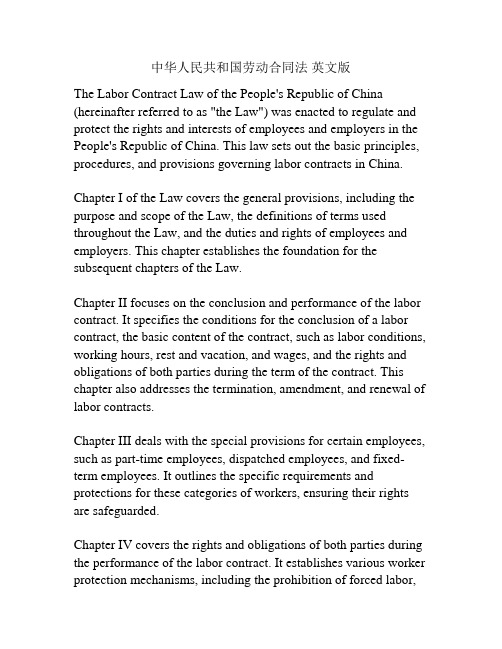
中华人民共和国劳动合同法英文版The Labor Contract Law of the People's Republic of China (hereinafter referred to as "the Law") was enacted to regulate and protect the rights and interests of employees and employers in the People's Republic of China. This law sets out the basic principles, procedures, and provisions governing labor contracts in China.Chapter I of the Law covers the general provisions, including the purpose and scope of the Law, the definitions of terms used throughout the Law, and the duties and rights of employees and employers. This chapter establishes the foundation for the subsequent chapters of the Law.Chapter II focuses on the conclusion and performance of the labor contract. It specifies the conditions for the conclusion of a labor contract, the basic content of the contract, such as labor conditions, working hours, rest and vacation, and wages, and the rights and obligations of both parties during the term of the contract. This chapter also addresses the termination, amendment, and renewal of labor contracts.Chapter III deals with the special provisions for certain employees, such as part-time employees, dispatched employees, and fixed-term employees. It outlines the specific requirements and protections for these categories of workers, ensuring their rights are safeguarded.Chapter IV covers the rights and obligations of both parties during the performance of the labor contract. It establishes various worker protection mechanisms, including the prohibition of forced labor,child labor, and gender discrimination. It also addresses matters such as training and skill enhancement, occupational safety and health, and social insurance.Chapter V establishes the collective agreements and collective contracts between the trade unions and employers. It stipulates the negotiation, conclusion, and implementation procedures for collective contracts, promoting harmonious labor relations and collective bargaining.Chapter VI deals with the supervision and inspection of labor contracts. It outlines the responsibilities of labor authorities in supervising the enforcement of labor contracts and handling disputes between employees and employers.Chapter VII establishes the legal liability and dispute resolution mechanisms. It stipulates the legal consequences that arise from the violation of labor contract obligations and provides employees with the right to claim compensation for damages. It also sets out the procedures for mediation, arbitration, and litigation to resolve labor disputes.Chapter VIII includes supplementary provisions, such as the application of the Law to labor contracts formed outside of China, the relationship with other laws, regulations, and provisions, and the implementation date of the Law.In conclusion, the Labor Contract Law of the People's Republic of China plays a crucial role in protecting the labor rights and interests of employees and employers. It sets out detailedprovisions on the conclusion, performance, termination, and dispute resolution of labor contracts, creating a fair and balanced legal framework for labor relations in China.。
劳动法中英文对照版

劳动法中英文对照版劳动法中英文对照版劳动合同法(中英文对照版)中华人民共和国劳劳合同法Labor Contract Law of the People’s Republic of ...适用本法。
国家机劳、事业单位、社会团体和与其建立劳劳劳系的劳劳...劳动合同法中英文对照版劳动合同法中英文对照版Order of the President of the People’s Republic of China 中华人民共和国主席令(第六十五号) 第六十五号) (No. 65) The Labor ...中华人民共和国劳动合同法(2008年版)(中英文对照版)中华人民共和国劳动合同法(2008年版)(中英文对照版) - 中华人民共和国劳动合同法主席令第六十五号《中华人民共和Labour Contract Law of the People...《中华人民共和国劳动法》中英文对照《中华人民共和国劳动法》中英文对照- Labor Law of the People's Republic of China The Labor Law of the People's Rep...劳动合同法(中英文版)确劳动合同双方权益,构建和发Article 2 This Law shall apply to the ...的劳动者,订立依照本法执行。
Article 3 The principle of lawfulness, ...埃塞俄比亚《劳动法》中英对照埃塞俄比亚《劳动法》中英对照- OF THE FEDERAL DEMOCRATIC REPUBLIC OF ETHIOPIA 埃塞俄比亚联邦民主共和国12th Year NO. 30 ADD...中英文对照劳动合同法中英文对照劳动合同法- 2008 新劳动合同法英文版全文( LAW OF THE PEOPLE'S REPUBLIC OF CHINA ON EMPLOYMENT CON...劳动合同中英对照劳动合同中英对照- 劳动合同年月日甲方(用人单位) : 名称: 法定代表人: 乙方(员工) : 姓名: 性别: 出生年月: 身份证号码: 户籍所在地: 联系方式: ...2013年杂志订阅目录中英文对照版) 《台声》《中国劳动法规与社会保障大全》月刊半月刊周刊半月刊月刊年刊720 元/年132 元/年2250 元/年2040 元/年120 元/年...2013报刊杂志目录中英文对照版) 《台声》《中国劳动法规与社会保障大全》旬刊月刊半月刊周刊半月刊月刊年刊540 元/年720 元/年132 元/年2250 元/年2040 元...资料库1 资料库2 资料库3 资料库4 资料库5。
劳动合同中英对照
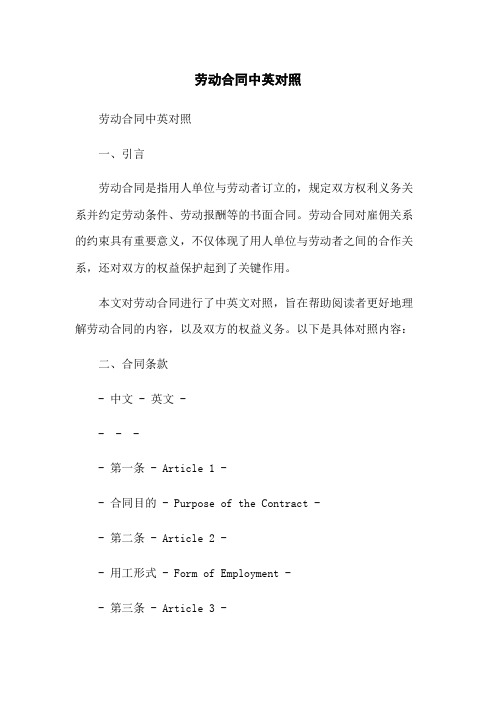
劳动合同中英对照劳动合同中英对照一、引言劳动合同是指用人单位与劳动者订立的,规定双方权利义务关系并约定劳动条件、劳动报酬等的书面合同。
劳动合同对雇佣关系的约束具有重要意义,不仅体现了用人单位与劳动者之间的合作关系,还对双方的权益保护起到了关键作用。
本文对劳动合同进行了中英文对照,旨在帮助阅读者更好地理解劳动合同的内容,以及双方的权益义务。
以下是具体对照内容:二、合同条款- 中文 - 英文 -- - -- 第一条 - Article 1 -- 合同目的 - Purpose of the Contract -- 第二条 - Article 2 -- 用工形式 - Form of Employment -- 第三条 - Article 3 -- 合同期限 - Contract Duration -- 第四条 - Article 4 -- 工作地点 - Workplace -- 第五条 - Article 5 -- 工作内容 - Job Description -- 第六条 - Article 6 -- 工作时间与休假 - Working Hours and Holidays -- 第七条 - Article 7 -- 工资与福利 - Salary and Benefits -- 第八条 - Article 8 -- 保密协议 - Confidentiality Agreement -- 第九条 - Article 9 -- 权益与责任 - Rights and Responsibilities -- 第十条 - Article 10 -- 终止合同 - Termination of the Contract -三、合同条款解读1. 第一条(合同目的):本条款明确了劳动合同的目的,即确立用人单位与劳动者之间的合作关系,并为双方权益保护提供法律依据。
2. 第二条(用工形式):本条款详细说明了用人单位与劳动者的用工形式,例如全职、兼职、临时等。
中华人民共和国劳动合同法英语版
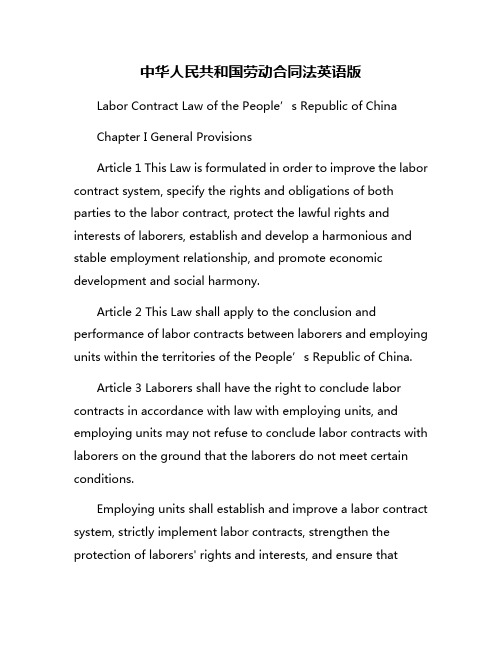
中华人民共和国劳动合同法英语版Labor Contract Law of the People’s Republic of ChinaChapter I General ProvisionsArticle 1 This Law is formulated in order to improve the labor contract system, specify the rights and obligations of both parties to the labor contract, protect the lawful rights and interests of laborers, establish and develop a harmonious and stable employment relationship, and promote economic development and social harmony.Article 2 This Law shall apply to the conclusion and performance of labor contracts between laborers and employing units within the territories of the People’s Republic of C hina.Article 3 Laborers shall have the right to conclude labor contracts in accordance with law with employing units, and employing units may not refuse to conclude labor contracts with laborers on the ground that the laborers do not meet certain conditions.Employing units shall establish and improve a labor contract system, strictly implement labor contracts, strengthen the protection of laborers' rights and interests, and ensure thatlaborers enjoy conditions of work in compliance with state regulations.Article 4 Labor contracts shall be concluded voluntarily through the consultation between laborers and employing units on an equal footing.When a laborer concludes a labor contract with an employing unit, the laborer may entrust a trade union to consult on his behalf.Article 5 Labor contracts shall be concluded in written form.An oral agreement reached by and between laborers and employing units to establish labor relations shall be deemed a labor contract. The employing unit shall then, within thirty days, provide the laborer with a written labor contract that fully specifies the matters agreed orally. If the employing unit fails to provide the laborer with the labor contract, the matters agreed upon orally shall be performed.Article 6 In concluding a labor contract, the lawful rights and interests and economic conditions of laborers shall be respected.Employing units may not force laborers to conclude labor contracts by means of deceit, coercion, or intimidation.Article 7 Labor contracts shall be performed in accordance with the principle of equality, voluntariness, fairness, and good faith.Article 8 Labor contracts shall include the following:(1) name, domicile, and legal representative or main person-in-charge of the employing unit;(2) name, domicile, resident identity card number or other valid identity certificate of the laborer;(3) term of the labor contract;(4) job description and place of work;(5) working hours, rest and leave, labor remuneration, social insurance, and other matters;(6) labor protection and working conditions;(7) other matters that should be included in the labor contract as required by laws and regulations.Article 9 A labor contract shall be concluded for a fixed term, a non-fixed term, or for a specified task.A labor contract concluded for a fixed term shall be held for no more than 10 years. When the term of a labor contract expires,and the laborer continuously works for the employing unit, the labor contract shall be deemed renewed on a non-fixed term basis.Article 10 An employing unit shall not stipulate in a labor contract that it may terminate the labor contract at will.Article 11 An employing unit shall not stipulate in a labor contract any provision that is less favorable to the laborer than the relevant laws and regulations.Chapter II Conclusion of Labor ContractsArticle 12 Laborers who conclude labor contracts with employing units shall meet the following conditions:(1) having full civil capacity;(2) having professional skills or expertise necessary for his job position;(3) having the physical capability necessary for his job position;(4) having other conditions prescribed by laws and administrative rules and regulations.Article 13 Laborers shall provide true information regarding their personal matters, professional skills or expertise, andphysical capability. Employing units shall not require laborers to provide false information.Article 14 Laborers and employing units shall conclude labor contracts in accordance with the principle of fairness, and may not breach any agreement to the disadvantage of the other party.Article 15 Employing units shall not restrict laborers in concluding labor contracts with other employing units to the disadvantage of laborers.Article 16 Employing units shall not conclude labor contracts with the employment of labor dispatch agencies to replace employment of laborers.Article 17 Employing units shall not employ child laborers.Article 18 Upon the conclusion of a labor contract, the employing unit shall provide the laborer with a copy of the labor contract. When the laborer requires, employing units shall provide a pay statement on a regular basis.Article 19 Employing units shall establish and improve a system for the filing of labor contracts.Chapter III Performance of Labor ContractsArticle 20 Employing units shall provide necessary working conditions for laborers to carry out their job duties and ensure labor protection in accordance with laws and regulations.Article 21 Employing units shall not demand that laborers work overtime, or work on their days of rest, in violation of the provisions of the state.Article 22 Employing units shall pay labor remuneration to laborers in full and on time, and shall not reduce or delay payment of labor remuneration without justifiable reasons.Article 23 Employing units shall provide social insurance for laborers in accordance with the law.Article 24 Laborers shall carry out their job duties in accordance with the labor contract, follow the employing unit's rules, and refrain from divulging trade secrets.Article 25 Laborers shall be entitled to protection of their lawful rights and interests in accordance with laws and regulations if employing units violate laws and regulations by reducing or delaying payment of labor remuneration, failing to provide labor protection, or unilaterally terminating a labor contract.Article 26 When a laborer is unable to work due to illness or non-work-related injury, the laborer shall provide certification issued by a medical institution at the same level.Article 27 Laborers shall not compete with the employing unit in breach of the labor contract. If a laborer breaches the labor contract by competing with the employing unit or leaving the employing unit, causing damage to the employing unit, the liability for compensation shall be borne in accordance.Chapter IV Modification and Termination of Labor ContractsArticle 28 Modifications to a labor contract shall be made through consultation between laborers and employing units.Article 29 Laborers may not refuse modifications to labor contracts proposed by employing units that comply with laws and regulations, industrial policies, and business conditions.Article 30 Employing units may not modify labor contracts with the employment of labor dispatch agencies to replace employment of laborers.Article 31 Labor contracts may be terminated under certain circumstances, including:(1) agreement by both parties;(2) the labor contract expires or both parties agree not to renew the contract;(3) the employing unit is dissolved, declared bankrupt, is ordered to shut down, or revokes its business license;(4) the employing unit formulates the labor contract by fraud or coercion;(5) the employing unit severely breaches laws and regulations, or the labor contract, causing irreparable harm to the laborer’s well-being.Article 32 When a labor contract is terminated, employing units shall issue a termination certificate or a service certificate and pay compensation in accordance with laws and regulations.Chapter V Supervision and InspectionArticle 33 Supervision and inspection of labor contract performance shall be conducted by labor and social security administrative departments in accordance with the law.Article 34 Laborers and trade unions shall have the right to report violations of laws and regulations regarding labor contracts to the relevant authorities.Article 35 Employing units shall cooperate with the relevant authorities in supervision and inspection of labor contract performance, accept supervision and inspection, and provide necessary materials and information.Article 36 The state shall establish a system of rewards for those who make important contributions and render meritorious services in the supervision and inspection of labor contract performance.Chapter VI Legal LiabilityArticle 37 If employing units violate the provisions of this Law in concluding, performing, modifying, or terminating labor contracts, they shall bear legal liability in accordance with the law.Article 38 If laborers violate the provisions of this Law, the employing unit may criticise, educate, or discipline them in accordance with the law.Article 39 If employing units’ violations of rights and interests of laborers lead to conflicts that may be resolved through mediation, both parties may apply for mediation from a labor dispute mediation institution.Article 40 If employing units’ violations of r ights and interests of laborers cause damage to laborers, employing units shall bear liability for compensation in accordance with the law.Article 41 If laborers’ violations of the provisions of this Law cause damage to employing units, laborers shall bear liability for compensation in accordance with the law.Chapter VII Supplementary ProvisionsArticle 42 This Law shall take effect on January 1, 2008.Article 43 The Labor Contract Law of the People’s Republic of China formulated by the Standing Committee of the National People's Congress on June 29, 1994, shall be repealed upon the implementation of this Law.以上为《中华人民共和国劳动合同法》全文的英语译文。
劳动法中英文对照版

劳动法中英文对照版劳动法中英文对照版劳动合同法(中英文对照版)中华人民共和国劳劳合同法Labor Contract Law of the People’s Republic of ...适用本法。
国家机劳、事业单位、社会团体和与其建立劳劳劳系的劳劳...劳动合同法中英文对照版劳动合同法中英文对照版Order of the President of the People’s Republic of China 中华人民共和国主席令(第六十五号) 第六十五号) (No. 65) The Labor ...中华人民共和国劳动合同法(2008年版)(中英文对照版)中华人民共和国劳动合同法(2008年版)(中英文对照版) - 中华人民共和国劳动合同法主席令第六十五号《中华人民共和Labour Contract Law of the People...《中华人民共和国劳动法》中英文对照《中华人民共和国劳动法》中英文对照- Labor Law of the People's Republic of China The Labor Law of the People's Rep...劳动合同法(中英文版)确劳动合同双方权益,构建和发Article 2 This Law shall apply to the ...的劳动者,订立依照本法执行。
Article 3 The principle of lawfulness, ...埃塞俄比亚《劳动法》中英对照埃塞俄比亚《劳动法》中英对照- OF THE FEDERAL DEMOCRATIC REPUBLIC OF ETHIOPIA 埃塞俄比亚联邦民主共和国12th Year NO. 30 ADD...中英文对照劳动合同法中英文对照劳动合同法- 2008 新劳动合同法英文版全文( LAW OF THE PEOPLE'S REPUBLIC OF CHINA ON EMPLOYMENT CON...劳动合同中英对照劳动合同中英对照- 劳动合同年月日甲方(用人单位) : 名称: 法定代表人: 乙方(员工) : 姓名: 性别: 出生年月: 身份证号码: 户籍所在地: 联系方式: ...2013年杂志订阅目录中英文对照版) 《台声》《中国劳动法规与社会保障大全》月刊半月刊周刊半月刊月刊年刊720 元/年132 元/年2250 元/年2040 元/年120 元/年 ...2013报刊杂志目录中英文对照版) 《台声》《中国劳动法规与社会保障大全》旬刊月刊半月刊周刊半月刊月刊年刊540 元/年720 元/年132 元/年2250 元/年2040 元...资料库1 资料库2 资料库3 资料库4 资料库5欢迎您下载我们的文档,后面内容直接删除就行资料可以编辑修改使用资料可以编辑修改使用致力于合同简历、论文写作、PPT设计、计划书、策划案、学习课件、各类模板等方方面面,打造全网一站式需求Ppt课件制作设计,word文档制作、图文设计制作、发布广告等,秉着以优质的服务对待每一位客户,做到让客户满意!感谢您下载我们文档。
(整理)劳动合同法中英文对照版.

中华人民共和国劳动合同法Labor Contract Law of the People’s Republic of China(2007年6月29日第十届全国人民代表大会常务委员会第二十八次会议通过)(Adopted at the 28th Session of Standing Committee of the Tenth National People’s Congress of the People’s Republic of China on June 29, 2007)目录(Content)第一章总则Chapter I General Provisions第二章劳动合同的订立Chapter II Formation of Labor Contracts第三章劳动合同的履行和变更Chapter III Fulfillment and Change of Labor Contracts第四章劳动合同的解除和终止Chapter IV Dissolution and Termination of Labor Contracts第五章特别规定Chapter V Special Provisions第一节集体合同Section 1 Collective Contract第二节劳务派遣Section 2 Worker Dispatch第三节非全日制用工Section 3 Part-time Employment第六章监督检查Chapter VI Supervision and Inspection第七章法律责任Chapter VII Legal Liabilities第八章附则Chapter VIII Supplementary Provisions第一章总则Chapter I General Provisions第一条为了完善劳动合同制度,明确劳动合同双方当事人的权利和义务,保护劳动者的合法权益,构建和发展和谐稳定的劳动关系,制定本法。
劳动合同全文中英对照版
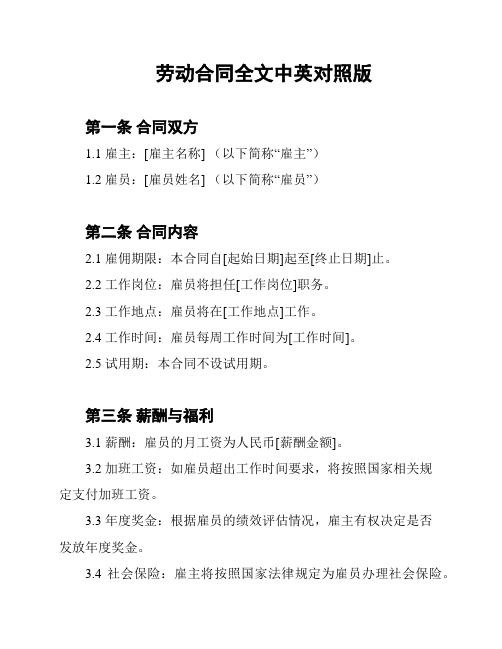
劳动合同全文中英对照版第一条合同双方1.1 雇主:[雇主名称] (以下简称“雇主”)1.2 雇员:[雇员姓名] (以下简称“雇员”)第二条合同内容2.1 雇佣期限:本合同自[起始日期]起至[终止日期]止。
2.2 工作岗位:雇员将担任[工作岗位]职务。
2.3 工作地点:雇员将在[工作地点]工作。
2.4 工作时间:雇员每周工作时间为[工作时间]。
2.5 试用期:本合同不设试用期。
第三条薪酬与福利3.1 薪酬:雇员的月工资为人民币[薪酬金额]。
3.2 加班工资:如雇员超出工作时间要求,将按照国家相关规定支付加班工资。
3.3 年度奖金:根据雇员的绩效评估情况,雇主有权决定是否发放年度奖金。
3.4 社会保险:雇主将按照国家法律规定为雇员办理社会保险。
3.5 带薪年假:雇员享有每年[带薪年假天数]天的带薪年假。
第四条工作义务4.1 雇员应按照雇主的工作安排和要求,认真履行工作职责。
4.2 雇员应保守雇主的商业机密和保密信息,不得泄露给任何第三方。
4.3 雇员不得在工作期间从事与工作无关的商业活动。
第五条终止合同5.1 合同期满:合同期满时,本合同自动终止,无需提前通知。
5.2 解除合同:任何一方可在提前[提前通知期限]提前通知对方解除合同。
5.3 解雇:如果雇员违反合同约定或工作不力,雇主有权解雇雇员。
第六条争议解决6.1 本合同的解释和执行均适用中华人民共和国的法律。
6.2 对于因履行本合同而发生的争议,双方应通过友好协商解决;协商不成的,应提交有管辖权的人民法院裁决。
第七条其他约定7.1 本合同一式两份,雇主和雇员各持一份,具有同等法律效力。
7.2 本合同自双方签字盖章之日起生效。
---Employment Contract (Chinese-English Version)Article 1: Parties to the Contract1.1 Employer: [Employer Name] (hereinafter referred to as "Employer")1.2 Employee: [Employee Name] (hereinafter referred to as "Employee")Article 2: Contract Details2.1 Employment Period: This contract is valid from [Start Date] to [End Date].2.2 Job Position: The Employee will hold the position of [Job Position].2.3 Workplace: The Employee will work at [Workplace].2.4 Working Hours: The Employee's weekly working hours will be [Working Hours].2.5 Probation: This contract does not include a probation period.Article 3: Remuneration and Benefits3.1 Salary: The Employee's monthly salary will be [Salary Amount] Chinese Yuan.3.3 Annual Bonus: The Employer has the discretion to grant an annual bonus based on the Employee's performance evaluation.3.4 Social Insurance: The Employer will provide social insurance for the Employee in accordance with the laws and regulations.3.5 Paid Annual Leave: The Employee is entitled to [Paid Annual Leave Days] days of paid annual leave per year.Article 4: Job Responsibilities4.1 The Employee shall diligently perform their job duties in accordance with the Employer's instructions and requirements.4.2 The Employee shall keep the Employer's trade secrets and confidential information strictly confidential and shall not disclose them to any third party.4.3 The Employee shall not engage in any business activities unrelated to their job during working hours.Article 5: Termination of Contract5.1 Expiration: Upon the expiration of the contract, it shall terminate automatically without prior notice.5.2 Termination Notice: Either party may give notice to terminate the contract with [Advance Notice Period] prior notice.5.3 Termination by Dismissal: The Employer has the right to dismiss the Employee if they violate the contract terms or perform poorly.Article 6: Dispute Resolution6.1 The interpretation and implementation of this contract shall be governed by the laws of the People's Republic of China.Article 7: Miscellaneous7.1 This contract is made in duplicate, with each party holding one copy, both of which have equal legal effect.。
中英文版的劳动合同法
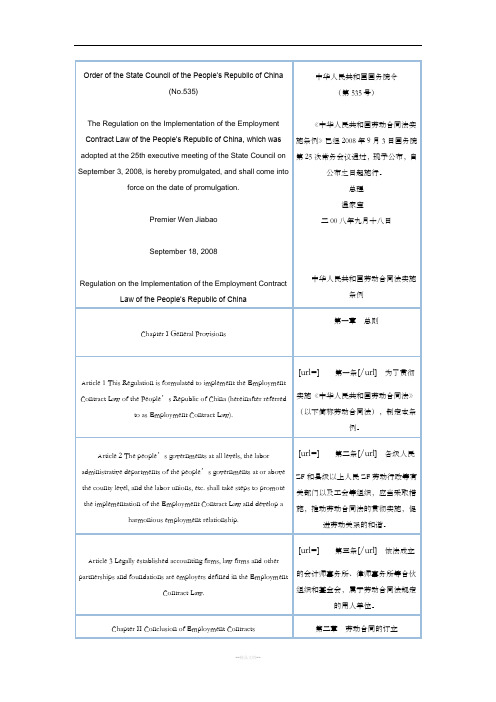
[url=]第四条[/url]劳动合同法规定的用人单位设立的分支机构,依法取得营业执照或者登记证书的,可以作为用人单位与劳动者订立劳动合同;未依法取得营业执照或者登记证书的,受用人单位委托可以与劳动者订立劳动合同。
Article 5 Where any employee, after being notified by the employer in writing, fails to conclude a written employment contract with the employer within one month from the day when he is employed, the employer shall terminate the employment relationship with the employee and notify the employee in writing, in which case, the employer is not required to make any economic compensation to the employee, but shall pay the employee for his actual working time.
[url=]第二条[/url]各级人民ZF和县级以上人民ZF劳动行政等有关部门以及工会等组织,应当采取措施,推动劳动合同法的贯彻实施,促进劳动关系的和谐。
Article 3 Legally established accounting firms, law firms and other partnerships and foundations are employers defined in the Employment Contract Law.
劳动规定合同中英文(中英文)
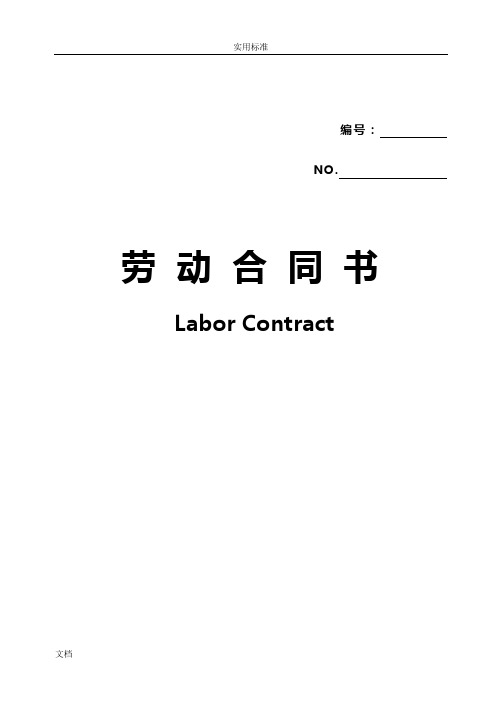
实用标准编号:NO.劳动合同书Labor Contract甲方:Party A:法定代表人(主要负责人)或委托代理人:Legal Representative (main responsible person) or Entrusted Agent:地址:Address:乙方:Party B (Employee):性别:Gender:通讯地址:Communication Address:居民身份证号码ID Card No.:联系电话:Telephone:根据《中华人民共和国劳动法》、《中华人民共和国劳动合同法》的有关规定,双方遵循公平合法、平等自愿、协商一致、诚实信用原则,订立本合同。
The contract is hereby concluded by both parties in accordance with Labor Law of the People's Republic of China, Labor Contract Law of the People’s Republic of China, in the principles of fairness, legitimacy, equality, voluntariness, consensus through negotiation and good faith.一、劳动合同期限Contract Term第一条本合同为固定期限劳动合同。
本劳动合同期限为年,其中试用期至年月日止。
本合同于年月日终止。
Article 1 : Party A and Party B signs a fixed-term labor contract.The contract lasts for ___ year(s), from _________to ________. The probation is ____ month(s), from ________ to ________.二、工作内容和工作地点Working Contents and Working Place 第二条乙方同意根据甲方工作需要,担任岗位(工种)工作。
最新劳动合同法中英文对照版
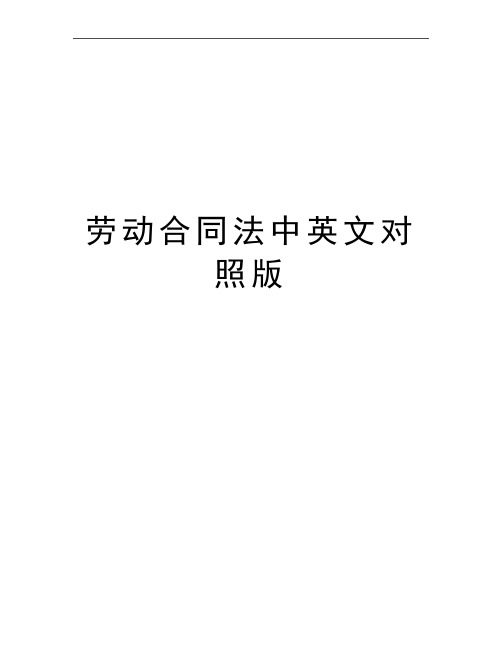
劳动合同法中英文对照版中华人民共和国劳动合同法Labor Contract Law of the People’s Republic of China(2007年6月29日第十届全国人民代表大会常务委员会第二十八次会议通过)(Adopted at the 28th Session of Standing Committee of the Tenth National People’s Congress of the People’s Republic of China on June 29, 2007)目录(Content)第一章总则Chapter I General Provisions第二章劳动合同的订立Chapter II Formation of Labor Contracts第三章劳动合同的履行和变更Chapter III Fulfillment and Change of Labor Contracts第四章劳动合同的解除和终止Chapter IV Dissolution and Termination of Labor Contracts第五章特别规定Chapter V Special Provisions第一节集体合同Section 1 Collective Contract第二节劳务派遣Section 2 Worker Dispatch第三节非全日制用工Section 3 Part-time Employment第六章监督检查Chapter VI Supervision and Inspection第七章法律责任Chapter VII Legal Liabilities第八章附则Chapter VIII Supplementary Provisions第一章总则Chapter I General Provisions第一条为了完善劳动合同制度,明确劳动合同双方当事人的权利和义务,保护劳动者的合法权益,构建和发展和谐稳定的劳动关系,制定本法。
2007年《劳动合同法》中英双版
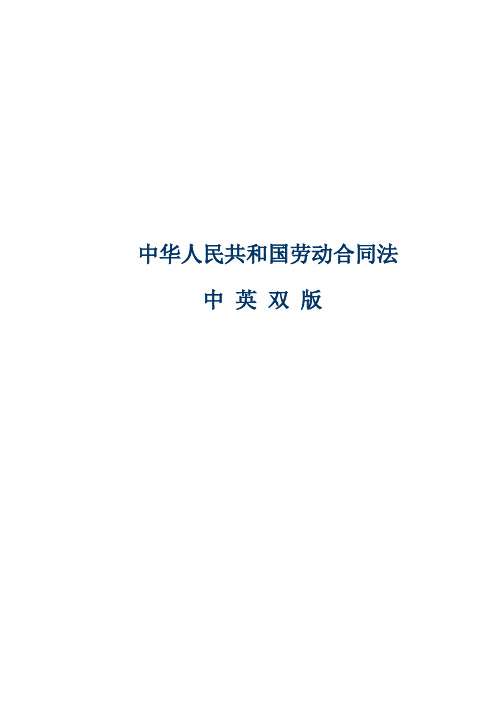
中华人民共和国劳动合同法中英双版《中华人民共和国劳动合同法》已由中华人民共和国第十届全国人民代表大会常务委员会第二十八次会议于2007年6月29日通过,现予公布,自2008年1月1日起施行。
中华人民共和国主席胡锦涛2007年6月29日中华人民共和国劳动合同法第一章总则第一条为了完善劳动合同制度,明确劳动合同双方当事人的权利和义务,保护劳动者的合法权益,构建和发展和谐稳定的劳动关系,制定本法。
第二条中华人民共和国境内的企业、个体经济组织、民办非企业单位等组织(以下称用人单位),与劳动者建立劳动关系,订立、履行、变更、解除或者终止劳动合同,适用本法。
国家机关、事业单位、社会团体和与其建立劳动关系的劳动者,订立、履行、变更、解除或者终止劳动合同,依照本法执行。
第三条订立劳动合同,应当遵循合法、公平、平等自愿、协商一致、诚实信用的原则。
劳动合同依法订立即具有法律效力,用人单位与劳动者应当履行劳动合同约定的义务。
第四条用人单位应当依法建立和完善劳动规章制度,保障劳动者享有劳动权利、履行劳动义务。
用人单位在制定、修改或者决定直接涉及劳动者切身利益的劳动报酬、工作时间、休息休假、劳动安全卫生、保险福利、职工培训、劳动纪律以及劳动定额管理等规章制度或者重大事项时,应当经职工代表大会或者全体职工讨论,提出方案和意见,与工会或者职工代表平等协商确定。
在规章制度实施过程中,工会或者职工认为用人单位的规章制度不适当的,有权向用人单位提出,通过协商作出修改完善。
直接涉及劳动者切身利益的规章制度应当公示,或者告知劳动者。
第五条县级以上人民政府劳动行政部门会同工会和企业方面代表,建立健全协调劳动关系三方机制,共同研究解决劳动关系方面的重大问题。
第六条工会应当帮助、指导劳动者与用人单位依法订立和履行劳动合同,并与用人单位建立集体协商机制,维护劳动者的合法权益。
第二章劳动合同的订立第七条用人单位自用工之日起即与劳动者建立劳动关系。
新劳动合同中英文双语版本(标准版)
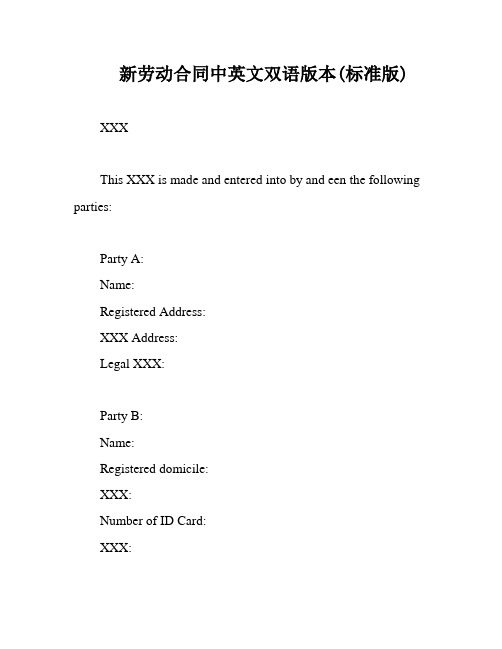
新劳动合同中英文双语版本(标准版)XXXThis XXX is made and entered into by and een the following parties:Party A:Name:Registered Address:XXX Address:Legal XXX:Party B:Name:Registered domicile:XXX:Number of ID Card:XXX:RECITALS:Whereas Party A is willing to employ Party B。
and Party B is willing to work for Party A。
in accordance with XXX of the People's Republic of China。
including the Labor Law。
Labor Contract Law。
and Shanghai Labor Contract ns。
as well as Party A'XXX agreement。
Party A and Party B have XXX (XXX "this Agreement").3.XXX and nsArticle 1 Type and Validity Term of Agreement1.1 This Agreement is an employment contract with either a fixed-term or an XXX on the date of commencement and expires on the date of n。
including a n d of () months from the date of commencement to the date of XXX.1.2 Party B shall report to work at the designated n on or before the date of commencement。
整理劳动合同法中英文版

整理劳动合同法中英文版Labor Contract双方基本信息:甲方:(公司名称)地址:法定代表人:联系电话:乙方:(个人姓名)身份证号码:联系电话:各方身份:甲方为雇主,乙方为劳动者。
权利、义务:1.甲方应当遵守国家的相关法律法规,与乙方签订本劳动合同并严格履行合同;2.乙方应当以诚信为原则,认真履行合同约定的工作职责;3.甲、乙双方应当相互尊重,平等协商,友好合作;4.乙方的工资应当按照国家规定的最低工资标准支付;5.乙方参加社会保险和住房公积金,按照国家规定的比例缴纳。
履行方式:1.乙方应当按照甲方规定的工作时间、地点和内容进行工作;2.乙方应当按照甲方的要求和标准完成工作任务,并及时向甲方汇报工作进展情况;3.甲方应当为乙方提供必要的工作条件和保障,保证乙方的安全和健康。
期限:本劳动合同为固定期限(或者无固定期限)劳动合同,期限为(具体期限或无固定期限)。
违约责任:1.若甲方未按照本合同约定支付乙方工资,则应当一次性赔偿乙方工资总额的30%的违约金;2.若乙方未按照本合同约定履行工作职责,则应当承担相应的法律责任。
遵守法律法规:1.甲、乙双方应当遵守国家的相关法律法规,不得违反劳动法规,不得采取非法手段剥削工人;2.甲方应当严格遵守劳动合同制度,不得违反本合同约定,不得随意解除本合同;3.乙方应当遵守守劳动纪律,不得擅自离岗串岗、旷工、迟到早退或者其他违反劳动规定的行为。
法律效力和可执行性:1.本劳动合同是双方平等协商的结果,具有法律效力;2.任何一方要解除本合同,应当提前(具体期限)通知对方;3.本合同的具体事宜,双方可以书面协商修改;4.因本合同引起的争议,双方应当优先协商解决,如协商不成,则应当提交劳动争议仲裁委员会或者依法向人民法院起诉。
其他:(双方约定的其他内容,例如试用期、奖励、福利等)。
劳动合同法(中英文版)
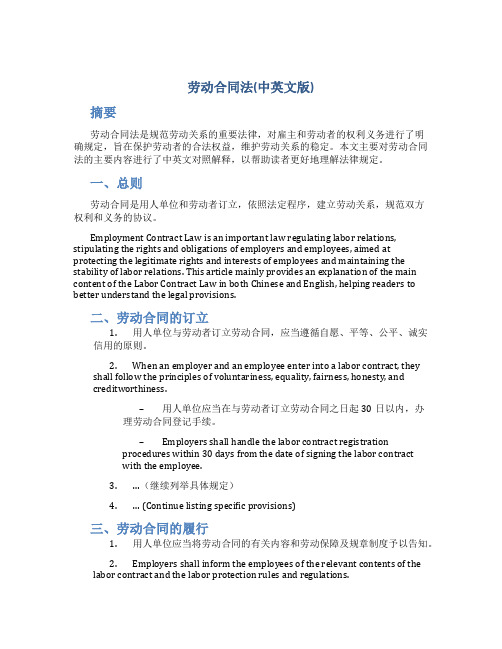
劳动合同法(中英文版)摘要劳动合同法是规范劳动关系的重要法律,对雇主和劳动者的权利义务进行了明确规定,旨在保护劳动者的合法权益,维护劳动关系的稳定。
本文主要对劳动合同法的主要内容进行了中英文对照解释,以帮助读者更好地理解法律规定。
一、总则劳动合同是用人单位和劳动者订立,依照法定程序,建立劳动关系,规范双方权利和义务的协议。
Employment Contract Law is an important law regulating labor relations, stipulating the rights and obligations of employers and employees, aimed at protecting the legitimate rights and interests of employees and maintaining the stability of labor relations. This article mainly provides an explanation of the main content of the Labor Contract Law in both Chinese and English, helping readers to better understand the legal provisions.二、劳动合同的订立1.用人单位与劳动者订立劳动合同,应当遵循自愿、平等、公平、诚实信用的原则。
2.When an employer and an employee enter into a labor contract, theyshall follow the principles of voluntariness, equality, fairness, honesty, andcreditworthiness.–用人单位应当在与劳动者订立劳动合同之日起30日以内,办理劳动合同登记手续。
最新劳动合同法_中英文
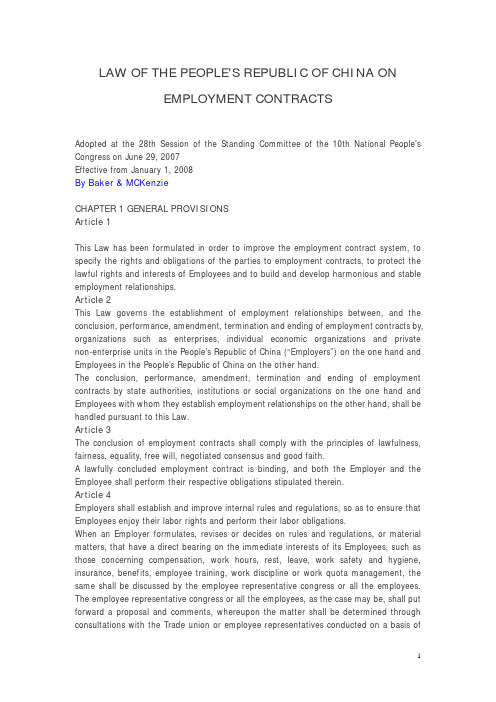
LAW OF THE PEOPLE'S REPUBLIC OF CHINA ONEMPLOYMENT CONTRACTSAdopted at the 28th Session of the Standing Committee of the 10th National People's Congress on June 29, 2007Effective from January 1, 2008By Baker & MCKenzieCHAPTER 1 GENERAL PROVISIONSArticle 1This Law has been formulated in order to improve the employment contract system, to specify the rights and obligations of the parties to employment contracts, to protect the lawful rights and interests of Employees and to build and develop harmonious and stable employment relationships.Article 2This Law governs the establishment of employment relationships between, and the conclusion, performance, amendment, termination and ending of employment contracts by, organizations such as enterprises, individual economic organizations and private non-enterprise units in the People’s Republic of China (“Employers”) on the one hand and Employees in the People’s Republic of China on the other hand.The conclusion, performance, amendment, termination and ending of employment contracts by state authorities, institutions or social organizations on the one hand and Employees with whom they establish employment relationships on the other hand, shall be handled pursuant to this Law.Article 3The conclusion of employment contracts shall comply with the principles of lawfulness, fairness, equality, free will, negotiated consensus and good faith.A lawfully concluded employment contract is binding, and both the Employer and the Employee shall perform their respective obligations stipulated therein.Article 4Employers shall establish and improve internal rules and regulations, so as to ensure that Employees enjoy their labor rights and perform their labor obligations.When an Employer formulates, revises or decides on rules and regulations, or material matters, that have a direct bearing on the immediate interests of its Employees, such as those concerning compensation, work hours, rest, leave, work safety and hygiene, insurance, benefits, employee training, work discipline or work quota management, the same shall be discussed by the employee representative congress or all the employees. The employee representative congress or all the employees, as the case may be, shall put forward a proposal and comments, whereupon the matter shall be determined through consultations with the Trade union or employee representatives conducted on a basis ofIf, during the implementation of an Employer’s rule or regulation or decision on a crucial matter, the Trade union or an employee is of the opinion that the same is inappropriate, it or he is entitled to communicate such opinion to the Employer, and the rule, regulation or decision shall be improved by making amendments after consultations.Rules and regulations, and decisions on material matters, that have a direct bearing on the immediate interests of Employees shall be made public or be communicated to the Employees by the Employer.Article 5The labor administration authorities of People’s Governments at the county level and above, together with the Trade union and enterprise representatives, shall establish a comprehensive tri-partite mechanism for the coordination of employment relationships, in order to jointly study and resolve major issues concerning employment relationships. Article 6A Trade union shall assist and guide Employees in the conclusion of employment contracts with their Employer and the performance thereof in accordance with the law, and establish a collective bargaining mechanism with the Employer in order to safeguard the lawful rights and interests of Employees.CHAPTER 2 CONCLUSION OF EMPLOYMENT CONTRACTSArticle 7An Employer’s employment relationship with a Employee is established on the date it starts using the Employee. An Employer shall keep a register of employees, for reference purposes.Article 8When an Employer hires a Employee, it shall truthfully inform him as to the content of the work, the working conditions, the place of work, occupational hazards, production safety conditions, labor compensation and other matters which the Employee requests to be informed about. The Employer has the right to learn from the Employee basic information which directly relates to the employment contract, and the Employee shall truthfully provide the same.Article 9When hiring a Employee, an Employer may not retain the Employee’s resident ID card or other papers, nor may it require him to provide security or collect property from him under some other guise.Article 10To establish an employment relationship, a written employment contract shall be concluded.In the event that no written employment contract was concluded at the time of establishment of an employment relationship, a written employment contract shall be concluded within one month after the date on which the Employer starts using the Employee.Where an Employer and a Employee conclude an employment contract before the Employer starts using the Employee, the employment relationship shall be established on the date on which the Employer starts using the Employee.In the event that an Employer fails to conclude a written employment contract with a Employee at the time its starts to use him, and it is not clear what labor compensation was agreed upon with the Employee, the labor compensation of the new Employee shall be decided pursuant to the rate specified in the collective contract; where there is no collective contract or the collective contract is silent on the matter, equal pay shall be given for equal work.Article 12Employment contracts are divided into fixed-term employment contracts, open-ended employment contracts and employment contracts to expire upon completion of a certain job.Article 13A “fixed-term employment contract” is an employment contract whose ending date is agreed upon by the Employer and the Employee.An Employer and a Employee may conclude a fixed-term employment contract upon reaching a negotiated consensus.Article 14An “open-ended employment contract” is an employment contract for which the Employer and the Employee have agreed not to stipulate a definite ending date.An Employer and a Employee may conclude an open-ended employment contract upon reaching a negotiated consensus. If a Employee proposes or agrees to renew his employment contract or to conclude an employment contract in any of the following circumstances, an open-ended employment contract shall be concluded, unless the Employee requests the conclusion of a fixed-term employment contract:(1) The Employee has been working for the Employer for a consecutive period of not less than 10 years;(2) when his Employer introduces the employment contract system or the state owned enterprise that employs him re-concludes its employment contracts as a result of restructuring, the Employee has been working for the Employer for a consecutive period of not less than 10 years and is less than 10 years away from his legal retirement age; or (3) prior to the renewal, a fixed-term employment contract was concluded on two consecutive occasions and the Employee is not characterized by any of the circumstances set forth in Article 39 and items (1) and (2) of Article 40 hereof.If an Employer fails to conclude a written employment contract with a Employee within one year from the date on which it starts using the Employee, the Employer and the Employee shall be deemed to have concluded an open-ended employment contract.Article 15An “employment contract with a term to expire upon completion of a certain job” is an employment contract in which the Employer and the Employee have agreed that the completion of a certain job is the term of the contract.An Employer and a Employee may, upon reaching a negotiated consensus, conclude an employment contract with a term to expire upon completion of a certain job.Article 16An employment contract shall become effective when the Employer and the Employeehave reached a negotiated consensus thereon and each of them has signed or sealed the text of such contract.The Employer and the Employee shall each hold one copy of the employment contract. Article 17An employment contract shall specify the following matters:(1) The name, domicile and legal representative or main person in charge of the Employer;(2) The name, domicile and number of the resident ID card or other valid identity document of the Employee;(3) The term of the employment contract;(4) The job description and the place of work;(5) Working hours, rest and leave;(6) Labor compensation;(7) Social insurance;(8) Labor protection, working conditions and protection against occupational hazards; and(9) Other matters which laws and statutes require to be included in employment contracts. In addition to the requisite terms mentioned above, an Employer and a Employee may agree to stipulate other matters in the employment contract, such as probation period, training, confidentiality, supplementary insurance and benefits, etc.Article 18If a dispute arises due to the fact that the rate or standards for labor compensation or working conditions, etc. are not explicitly specified in the employment contract, the Employer and the Employee may renegotiate. If the negotiations are unsuccessful, the provisions of the collective contract shall apply. If there is no collective contract or the collective contract is silent on the issue of labor compensation, equal pay shall be given for equal work; if there is no collective contract or the collective contract is silent on the issue of working conditions, the relevant regulations of the state shall apply.Article 19If an employment contract has a term of not less than three months but less than one year, the probation period may not exceed one month; if an employment contract has a term of more than one year and less than three years, the probation period may not exceed two months; and if an employment contract has a term of not less than three years or is open-ended, the probation period may not exceed six months.An Employer may stipulate only one probation period with any given Employee.No probation period may be specified in an employment contract with a term to expire upon completion of a certain job or an employment contract with a term of less than three months.The probation period shall be included in the term of the employment contract. If an employment contract provides for a probation period only, then there is no probation period and the term concerned shall be the term of the employment contract.Article 20The wages of a Employee on probation may not be less than the lowest wage level for the same job with the Employer or less than 80 percent of the wage agreed upon in the employment contract, and may not be less than the minimum wage rate in the place where the Employer is located.Article 21An Employer may not terminate an employment contract during the probation period unless the Employee is characterized by any of the circumstances set forth in Article 39 and items (1) and (2) of Article 40 hereof. If an Employer terminates an employment contract during the probation period, it shall explain the reasons to the Employee. Article 22If an Employer provides special funding for a Employee’s training and gives him professional technical training, it may conclude an agreement specifying a term of service with such Employee.If the Employee breaches the agreement on the term of service, he shall pay liquidated damages to the Employer as agreed. The measure of the liquidated damages may not exceed the training expenses paid by the Employer. The liquidated damages that the Employer requires the Employee to pay may not exceed the portion of the training expenses allocable to the unperformed portion of the term of service.The reaching of agreement on a term of service between the Employer and the Employee does not affect the raising of the Employee’s labor compensation during the term of service according to the normal wage adjustment mechanism.Article 23An Employer and a Employee may include in their employment contract provisions on confidentiality matters relating to maintaining the confidentiality of the trade secrets of the Employer and to intellectual property.If a Employee has a confidentiality obligation, the Employer may agree with the Employee on competition restriction provisions in the employment contract or confidentiality agreement, and stipulate that the Employer shall pay financial compensation to the Employee on a monthly basis during the term of the competition restriction after the termination or ending of the employment contract. If the Employee breaches the competition restriction provisions, he shall pay liquidated damages to the Employer as stipulated.Article 24The personnel subject to competition restrictions shall be limited to the Employer’s senior management, senior technicians and other personnel with a confidentiality obligation. The scope, territory and term of the competition restrictions shall be agreed upon by the Employer and the Employee, and such agreement shall not violate laws and regulations. The term, counted from the termination or ending of the employment contract, for which a person as mentioned in the preceding paragraph is subject to competition restrictions in terms of his working for a competing Employer that produces the same type of products or is engaged in the same type of business as his current Employer, or in terms of his establishing his own business to produce the same type of products or engage in the same type of business, shall not exceed two years.Article 25With the exception of the circumstances specified in Article s 22 and 23 hereof, an Employer may not stipulate with a Employee provisions on the bearing of liquidated damages by the Employee.Article 26An employment contract shall be invalid or partially invalid if:(1) A party uses such means as deception or coercion, or takes advantage of the other party’s difficulties, to cause the other party to conclude an employment contract, or to make an amendment thereto, that is contrary to that party’s true intent;(2) The Employer disclaims its legal liability or denies the Employee his rights; or(3) Mandatory provisions of laws or administrative statutes are violated.If the invalidity or partial invalidity of the employment contract is disputed, it shall be confirmed by a labor dispute arbitration institution or a People’s Court.Article 27If certain provisions of an employment contract are invalid and such invalidity does not affect the validity of the remaining provisions, the remaining provisions shall remain valid. Article 28If an employment contract is confirmed as invalid and the Employee has already performed labor, the Employer shall pay the Employee labor compensation. The amount of labor compensation shall be determined with reference to the labor compensation of Employees in the same or a similar position with the Employer.CHAPTER 3 PERFORMANCE AND AMENDMENT OF EMPLOYMENT CONTRACTSArticle 29The Employer and the Employee shall each fully perform its/his obligations in accordance with the employment contract.Article 30Employers shall pay their Employees labor compensation on time and in full in accordance with the employment contracts and state regulations.If an Employer falls into arrears with the payment of labor compensation or fails to make payment in full, the Employee may, in accordance with the law, apply to the local People’s Court for an order to pay; and the People’s Court shall issue such order in accordance with the law.Article 31Employers shall strictly implement the work quota standards and may not compel or in a disguised manner compel Employees to work overtime. If an Employer arranges for a Employee to work overtime, it shall pay him overtime pay in accordance with the relevant state regulations.Article 32Employees shall not be held in breach of their employment contracts if they refuse to perform dangerous operations that are instructed in violation of regulations or peremptorily ordered by management staff of the Employer.Employees have the right to criticize, report to the authorities or lodge accusations against their Employers in respect of working conditions that endanger their lives or health. Article 33Changes such a change in the name, legal representative or main person in charge of, or an (the) investor(s) in, an Employer shall not affect the performance of its employment contracts.Article 34If an Employer is merged or divided, etc., its existing employment contracts shall remain valid and continue to be performed by the Employer(s) which succeeded to its rights and obligationsArticle 35An Employer and a Employee may amend the provisions of their employment contract if they so agree after consultations. Amendments to an employment contract shall be made in writing.The Employer and the Employee shall each hold one copy of the amended employment contract.CHAPTER 4 TERMINATION AND ENDING OF EMPLOYMENT CONTRACTSArticle 36An Employer and a Employee may terminate their employment contract if they so agree after consultations.Article 37A Employee may terminate his employment contract upon 30 days’ prior written notice to his Employer. During his probation period, a Employee may terminate his employment contract by giving his Employer three days’ prior notice.Article 38A Employee may terminate his employment contract if his Employer:(1) Fails to provide the labor protection or working conditions specified in the employment contract;(2) Fails to pay labor compensation in full and on time;(3) Fails to pay the social insurance premiums for the Employee in accordance with the law;(4) Has rules and regulations that violate laws or regulations, thereby harming the Employee’s rights and interests;(5) causes the employment contract to be invalid due to a circumstance specified in the first paragraph of Article 26 hereof;(6) Gives rise to another circumstance in which laws or administrative statutes permit a Employee to terminate his employment contract.If an Employer uses violence, threats or unlawful restriction of personal freedom to compel a Employee to work, or if a Employee is instructed in violation of rules and regulations or peremptorily ordered by his Employer to perform dangerous operations which threaten his personal safety, the Employee may terminate his employment contract forthwith without giving prior notice to the Employer.Article 39An Employer may terminate an employment contract if the Employee:(1) Is proved during the probation period not to satisfy the conditions for employment;(2) Materially breaches the Employer’s rules and regulations;(3) Commits serious dereliction of duty or practices graft, causing substantial damage to the Employer;(4) has additionally established an employment relationship with another Employer which materially affects the completion of his tasks with the first-mentioned Employer, or he refuses to rectify the matter after the same is brought to his attention by the Employer;(5) causes the employment contract to be invalid due to the circumstance specified in item(1) of the first paragraph of Article 26 hereof; or(6) Has his criminal liability pursued in accordance with the law.Article 40An Employer may terminate an employment contract by giving the Employee himself 30 days’ prior written notice, or one month’s wage in lieu of notice, if:(1) after the set period of medical care for an illness or non-work-related injury, the Employee can engage neither in his original work nor in other work arranged for him by his Employer;(2) The Employee is incompetent and remains incompetent after training or adjustment of his position; or(3) A major change in the objective circumstances relied upon at the time of conclusion of the employment contract renders it unperformable and, after consultations, the Employer and Employee are unable to reach agreement on amending the employment contract. Article 41If any of the following circumstances makes it necessary to reduce the workforce by 20 persons or more or by a number of persons that is less than 20 but accounts for 10 percent or more of the total number of the enterprise’s employees, the Employer may reduce the workforce after it has explained the circumstances to its Trade union or to all of its employees 30 days in advance, has considered the opinions of the Trade union or the employees and has subsequently reported the workforce reduction plan to the labor administration department:(1) Restructuring pursuant to the Enterprise Bankruptcy Law;(2) Serious difficulties in production and/or business operations;(3) The enterprise switches production, introduces a major technological innovation or revises its business method, and, after amendment of employment contracts, still needs to reduce its workforce; or(4) Another major change in the objective economic circumstances relied upon at the time of conclusion of the employment contracts, rendering them unperformable.When reducing the workforce, the Employer shall retain with priority persons:(1) Who have concluded with the Employer fixed-term employment contracts with a relatively long term;(2) Who have concluded open-ended employment contracts with the Employer; or(3) Who are the only ones in their families to be employed and whose families have an elderly person or a minor for whom they need to provide.If an Employer that has reduced its workforce pursuant to the first paragraph hereof hires again within six months, it shall give notice to the persons dismissed at the time of the reduction and, all things being equal, hire them on a preferential basis.Article 42An Employer may not terminate an employment contract pursuant to Article40 or Article 41 hereof if the Employee:(1) is engaged in operations exposing him to occupational disease hazards and has not undergone a pre-departure occupational health check-up, or is suspected of having contracted an occupational disease and is being diagnosed or under medical observation;(2) Has been confirmed as having lost or partially lost his capacity to work due to anoccupational disease contracted or a work-related injury sustained with the Employer; (3) Has contracted an illness or sustained a non-work-related injury, and the set period of medical care therefore has not expired;(4) Is a female employee in her pregnancy, confinement or nursing period;(5) Has been working for the Employer continuously for not less than 15 years and is less than 5 years away from his legal retirement age;(6) Finds himself in other circumstances stipulated in laws or administrative statutes. Article 43When an Employer is to terminate an employment contract unilaterally, it shall give the Trade union advance notice of the reason therefore. If the Employer violates laws, administrative statutes or the employment contract, the Trade union has the right to demand that the Employer rectify the matter. The Employer shall study the Trade union’s opinions and notify the Trade union in writing as to the outcome of its handling of the matter.Article 44An employment contract shall end if:(1) Its term expires;(2) The Employee has commenced drawing his basic old age insurance pension in accordance with the law;(3) The Employee dies, or is declared dead or missing by a People’s Court;(4) The Employer is declared bankrupt;(5) The Employer has its business license revoked, is ordered to close or is closed down, or the Employer decides on early liquidation; or(6) Another circumstance specified in laws or administrative statutes arises.Article 45If an employment contract expires and any of the circumstances specified inArticle 42 hereof applies, the term of the employment contract shall be extended until the relevant circumstance ceases to exist, at which point the contract shall end. However, matters relating to the ending of the employment contract of a Employee who has lost or partially lost his capacity to work as specified in item (2) of Article 42 hereof shall be handled in accordance with state regulations on work-related injury insurance.Article 46In any of the following circumstances, the Employer shall pay the Employee severance pay:(1) The employment contract is terminated by the Employee pursuant to Article 38 hereof;(2) The employment contract is terminated after such termination was proposed to the Employee by the Employer pursuant to Article 36 hereof and the parties reached agreement thereon after consultations;(3) The employment contract is terminated by the Employer pursuant to Article 40 hereof;(4) The employment contract is terminated by the Employer pursuant to the first paragraph of Article 41 hereof;(5) The employment contract is a fixed–term contract that ends pursuant to item (1) of Article 44 hereof, unless the Employee does not agree to renew the contract even though the conditions offered by the Employer are the same as or better than those stipulated in the current contract;(6) The employment contract ends pursuant to item (4) or (5) of Article 44 hereof;(7) Other circumstances specified in laws or administrative statutes.Article 47A Employee shall be paid severance pay based on the number of years worked with the Employer at the rate of one month’s wage for each full year worked. Any period of not less than six months but less than one year shall be counted as one year. The severance pay payable to a Employee for any period of less than six months shall be one-half of his monthly wages.If the monthly wage of a Employee is greater than three times the average monthly wage of employees in the Employer’s area as published by the People’s Government at the level of municipality directly under the central government or municipality divided into districts of the area1 where the Employer is located, the rate for the severance pay paid to him shall be three times the average monthly wage of employees and shall be for not more than 12 years of work.For the purposes of this Article, the term “monthly wage” means the Employee’s average monthly wage for the 12 months prior to the termination or ending of his employment contract.Article 48If an Employer terminates or ends an employment contract in violation of thisLaw and the Employee demands continued performance of such contract, the Employer shall continue performing the same. If the Employee does not demand continued performance of the employment contract or if continued performance of the employment contract has become impossible, the Employer shall pay damages pursuant to Article 87 hereof.Article 49The state will take measures to establish a comprehensive system that enables Employees’ social insurance accounts to be transferred from one region to another and to be continued in such other region.Article 50At the time of termination or ending of an employment contract, the Employer shall issue a proof of termination or ending of the employment contract and, within 15 days, carry out the procedures for the transfer of the Employee’s file and social insurance account.The Employee shall carry out the procedures for the handover of his work as agreed by the parties. If relevant provisions of this Law require the Employer to pay severance pay, it shall pay the same upon completion of the procedures for the handover of the work.The Employer shall keep terminated or ended employment contracts on file for not less than two years, for reference purposes.CHAPTER 5 SPECIAL PROVISIONSSECTION 1 COLLECTIVE CONTRACTArticle 51After bargaining on an equal basis, enterprise employees, as one party, and their Employer。
